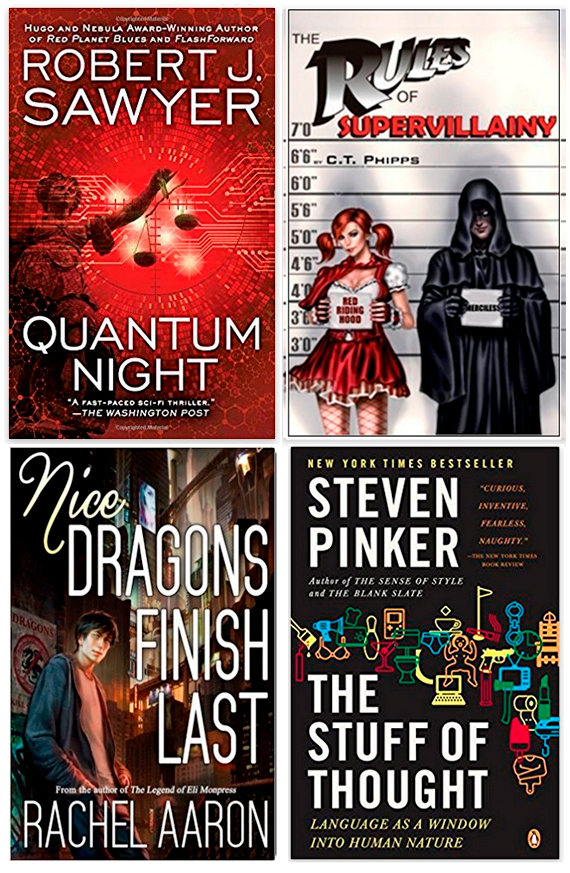Always Uttori April INTJ Reading List (2017)
Last month, we highlighted books perfect for satiating your spring wanderlust. This month, the Always Uttori April INTJ Reading List focuses on moral complexity in fiction and, in non-fiction, how language use reveals our inner selves.
Fiction:
Quantum Night – Robert J. Sawyer (2016)

This psychological thriller is both well-written and well-researched, so much so that a few times I had to remind myself that it was a work of fiction and not reality. The premise sounds a little fantastical, but Sawyer sets it up in an easy to follow way that is guaranteed to take you along for the ride. The heavy focus on medical/psychological science, though fictional, will appeal to INTJs who love scientific theories and what-if scenarios.
Book Summary:
Experimental psychologist Jim Marchuk has developed a flawless technique for identifying the previously undetected psychopaths lurking everywhere in society. While being cross-examined about his breakthrough in court, Jim is shocked to discover that he has lost his memories of six months of his life from 20 years previously – a dark time during which he himself committed heinous acts.
Jim is reunited with Kayla Huron, his forgotten girlfriend from his lost period and now a quantum physicist who has made a stunning discovery about the nature of human consciousness. As a rising tide of violence and hate sweeps across the globe, the psychologist and the physicist combine forces in a race against time to see if they can do the impossible – change human nature – before the entire world descends into darkness.
Listen to a 5-minute preview here.
The Rules of Supervillainy – C.T. Phipps (2015)

A humorous book about an ordinary guy becoming the most heroic supervillain. It is funny, interesting, and morally ambiguous, perfect for INTJs wanting to live vicariously on the evil mastermind side.
Book Summary:
Gary Karkofsky is an ordinary guy with an ordinary life living in an extraordinary world. Supervillains, heroes, and monsters are a common part of the world he inhabits. Yet, after the death of his hometown’s resident superhero, he gains the amazing gift of the late champion’s magical cloak. Deciding he prefers to be rich rather than good, Gary embarks on a career as Merciless: The Supervillain Without Mercy. But is he evil enough to be a villain in America’s most crime-ridden city? Gary soon finds himself surrounded by a host of the worst of Falconcrest City’s toughest criminals. Supported by his long-suffering wife, his ex-girlfriend turned professional henchwoman, and a has-been evil mastermind, Gary may end up being not the hero they want but the villain they need.
Listen to a 5-minute preview here.
Nice Dragons Finish Last – Rachel Aaron (2014)
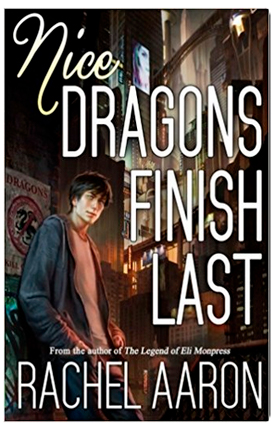
This book is the first book in the Heartstriker series. I will be honest, this is a fun read for the idealist INTJ. Note, it’s not until the second and third books that this series goes from being a light, almost standard read, to being near obsession-worthy (I am excited waiting for the next book). A modern urban fantasy with a unique situation and great world, this is a series that an INTJ can appreciate. Note, the main heroine can be a bit annoying, but she’s not even the point of the book, so there’s that.
Book Summary:
As the smallest dragon in the Heartstriker clan, Julius survives by a simple code: keep quiet, don’t cause trouble, and stay out of the way of bigger dragons. But this meek behavior doesn’t fly in a family of ambitious magical predators, and his mother, Bethesda the Heartstriker, has finally reached the end of her patience. Now, sealed in human form and banished to the DFZ – a vertical metropolis built on the ruins of Old Detroit – Julius has one month to prove he can be a ruthless dragon or kiss his true shape goodbye forever. But in a city of modern mages and vengeful spirits where dragons are considered monsters to be exterminated, he’s going to need some serious help to survive this test. He only hopes humans are more trustworthy than dragons….
Listen to 5-minute preview here.
Non-Fiction:
Stuff of Thought: Language as a window into Human Nature – Steven Pinker (2008)
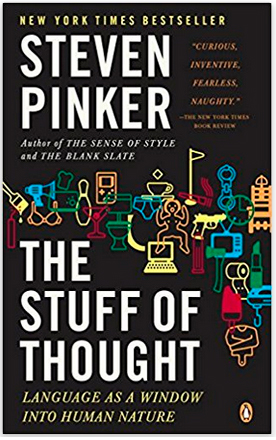
This is a book that needs to be listened to multiple times to fully absorb and understand. I’ve only listen to it once, but it’s on my re-read list for sure. This is a truly interesting read about how language use reveals culture, perspectives, and our true nature.
Book Summary:
New York Times best-selling author Steven Pinker possesses that rare combination of scientific aptitude and verbal eloquence that enables him to provide lucid explanations of deep and powerful ideas. His previous books, including the Pulitzer Prize finalist The Blank Slate, have catapulted him into the limelight as one of today’s most important and popular science writers.
Now, in The Stuff of Thought, Pinker marries two of the subjects he knows best: language and human nature. The result is a fascinating look at how our words explain our nature. What does swearing reveal about our emotions? Why does innuendo disclose something about relationships? Pinker reveals how our use of prepositions and tenses taps into peculiarly human concepts of space and time, and how our nouns and verbs speak to our notions of matter. Even the names we give our babies have important things to say about our relations to our children and to society.
With his signature wit and style, Pinker takes on scientific questions like whether language affects thought, as well as forays into everyday life: why is bulk e-mail called spam, and how do romantic comedies get such mileage out of the ambiguities of dating?
Listen to 5 minute preview here.
The Violinist Thumb: And Other Lost Tales of Love, War, and Genius, as Written by Our Genetic Code – Sam Kean (2012)
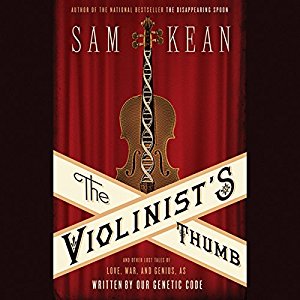
This book does a great job of explaining complex concepts (for us non geneticist) and telling memorable and remarkable stories about the history and future of genetics.
Book Summary:
From New York Times best-selling author Sam Kean come more incredible stories of science, history, language, and music, as told by our own DNA.
In The Disappearing Spoon, best-selling author Sam Kean unlocked the mysteries of the periodic table. In The Violinist’s Thumb, he explores the wonders of the magical building block of life: DNA.
There are genes to explain crazy cat ladies, why other people have no fingerprints, and why some people survive nuclear bombs. Genes illuminate everything from JFK’s bronze skin (it wasn’t a tan) to Einstein’s genius. They prove that Neanderthals and humans bred thousands of years more recently than any of us would feel comfortable thinking. They can even allow some people, because of the exceptional flexibility of their thumbs and fingers, to become truly singular violinists.
Kean’s vibrant storytelling once again makes science entertaining, explaining human history and whimsy while showing how DNA will influence our species’ future.
Listen to 5-minute summary here.
The Organized Mind: Thinking Straight in the Age of Information Overload- Daniel J. Levitin (2014)
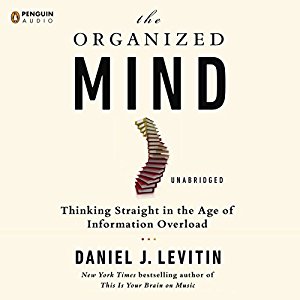
This is one I haven’t finished yet, but it is infinitely interesting, overwhelming, and helpful. A must read for anyone, INTJ or not.
Book Summary:
New York Times best-selling author and neuroscientist Daniel J. Levitin shifts his keen insights from your brain on music to your brain in a sea of details.
The information age is drowning us with an unprecedented deluge of data. At the same time, we’re expected to make more – and faster – decisions about our lives than ever before. No wonder, then, that the average American reports frequently losing car keys or reading glasses, missing appointments, and feeling worn out by the effort required just to keep up.
But somehow some people become quite accomplished at managing information flow. In The Organized Mind, Daniel J. Levitin, PhD, uses the latest brain science to demonstrate how those people excel – and how listeners can use their methods to regain a sense of mastery over the way they organize their homes, workplaces, and time.
With lively, entertaining chapters on everything from the kitchen junk drawer to health care to executive office workflow, Levitin reveals how new research into the cognitive neuroscience of attention and memory can be applied to the challenges of our daily lives. This Is Your Brain on Music showed how to better play and appreciate music through an understanding of how the brain works. The Organized Mind shows how to navigate the churning flood of information in the 21st century with the same neuroscientific perspective.
Listen to 5 minute preview here.
